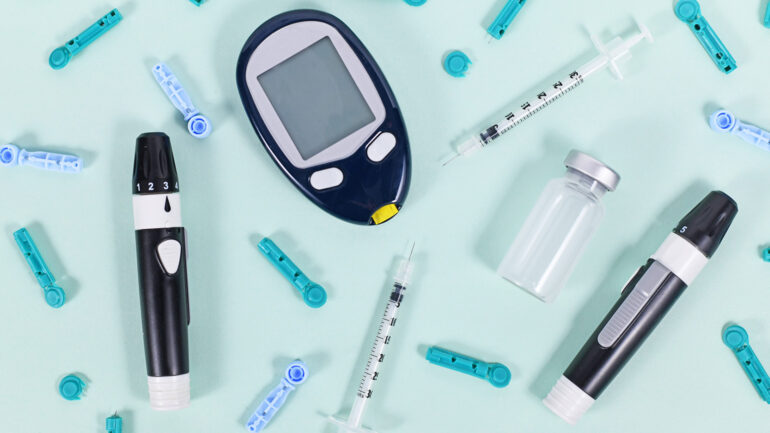Type 2 diabetes is a serious health condition that impacts millions of people across the United States and around the world (Calvano et al., 2019; Visaria et al., 2020). In fact, type 2 diabetes mellitus (T2DM) accounts for 90 to 95% of all cases of diabetes (Antwi et al., 2020; Visaria et al., 2020). Considered a metabolic disturbance, diabetes occurs when someone has elevated levels of glucose in the blood. Blood sugar or glucose is the body’s primary energy source, and blood sugar levels are regulated by insulin. In type 2 diabetes, this regulation is impaired, leading to fluctuations that can have significant consequences. Symptoms can include insulin resistance, fatigue, excessive thirst, gut dysbiosis, neurotransmitter imbalances, and increased urination (Borovcanin et al., 2023). Many cases of type 2 diabetes remain undiagnosed mainly due to a lack of awareness among both the general population and healthcare professionals. The initial stages of diabetes, and even intermediate cases, are often asymptomatic, whereby many years can go by without a diagnosis, until complications eventually arise (Pinchevsky et al., 2020).
Additionally, for every two years a person is overweight, their risk of developing type 2 diabetes rises by 9%, up to 14% for obese individuals, consequently increasing the risk of cardiovascular disease influencing related comorbidities, including hyperlipidemia, hypertension, insulin resistance, endothelial dysfunction, and inflammation (Pinchevsky et al., 2020). Unfortunately, type 2 diabetes is also a leading cause of significant disability (for an overview, see Table 1; Deswita et al., 2020), which contributes to significant economic and societal costs, and even increases the risk of death (Nousen, Franco, & Sullivan, 2013; Parker et al., 2024).
Mental health professionals may have a valuable opportunity to help ensure that the consequences of type 2 diabetes are minimized when possible. This could include promoting psychoeducation, providing cognitive behavioral therapy, and utilizing motivational interviewing. To increase awareness of type 2 diabetes among mental health clinicians, this beginner’s guide provides an overview of the consequences, risk factors, health outcomes, role of whole food nutrition, lifestyle choices, and psychological interventions for clients with type 2 diabetes.
Potential Consequences
Amputation
Biochemical imbalances
Cancer
Cardiovascular disease
Cognitive impairment
Dental problems
Elevated blood pressure
Kidney disease (e.g., nephropathy
Metabolic syndrome
Neuropathy
Nervous system diseases
Pregnancy complications
Stroke
Thyroid disease
Vision problems (e.g., blindness and retinopathy)
Poor dietary practices play a critical role in driving the escalating prevalence of type 2 diabetes (Kwan et al., 2020). Foremost, an over-reliance on Western diet staples such as excessive amounts of sugar, processed red meats, and foods with high glycemic index (GI) or load increases the risk of type 2 diabetes (Ballon, Neuenschwander, & Schlesinger, 2019). Further, hypoglycemia is strongly linked to type 2 diabetes, and may be influenced by meal skipping, elevated levels of stress, and drug and alcohol use (Rzepczyk et al., 2022). Other risk factors that may play a role in the prevalence of type 2 diabetes include sedentary lifestyles, consuming tobacco products, unmanaged hypertension, experiencing high levels of depression, chronic sleep-related problems, and socioeconomic stress (e.g., poverty and homelessness) Brzecka et al., 2020; Garcia-Argibay et al., 2023; de Groot et al., 2012). Type 2 diabetes mellitus is often regarded as a “lifestyle disease,” as it is commonly associated with individuals who have elevated Body Mass Index (BMI), high blood pressure, and other cardiovascular risk factors (Pinchevesky, 2020). Table 2 provides an overview of risk factors for the onset and progression of type 2 diabetes (Bondy et al., 2020; Chen et al., 2012; Garcia-Argibay et al., 2023; Grajales et al., 2019; Haghighatpanah et al., 2024). Socioeconomic stress can be further understood through Social Determinants of Health (SDOH) and Adverse Childhood Experiences (ACEs). SDOH (a term adopted by the CDC from the WHO) are non-medical conditions and influences that impact health outcomes. They can include where we are born, work, or age. Additionally, SDOH can be influenced by economic policies, social norms, and social policies to name a few (CDC, 2024).
Considering a client’s ACE score can also be valuable. This is a ten-item questionnaire that considers the impact of childhood trauma on future health and behaviors. Those with higher scores have been shown to have a 12x greater likelihood of several physical and mental health challenges including suicide attempt and depression among others. We need to consider adversity as a factor in health and development in addition to its social impact (Webster, 2022).
| Area | Risk Factors |
|
|
|
| Behavioral |
|
|
|
|
| Biological |
|
|
|
|
| Demographics |
|
|
|
|
| Environmental |
|
|
|
|
| Medications |
|
|
|
|
| Physiological |
|
|
|
|
| Psychological |
|
Diabetes and whole food nutrition
Eating a balanced diet is one of the most effective ways to prevent and manage diabetes. Such a diet should include appropriate proportions of carbohydrates, proteins, and fats. For instance, proteins and fats slow the digestion and absorption of carbohydrates, leading to a more gradual release of glucose into the bloodstream (Hall et al., 2018). Lean proteins such as fish, poultry, beans, and legumes, along with healthy fats from sources like avocados, nuts, and olive oil, can also help stabilize blood sugar levels and provide sustained energy throughout the day.
Individuals can better manage their blood sugar levels both as prevention as well as after diagnosis and overall health by focusing their diet on whole foods. These include low GI foods such as fruits, vegetables, whole grains, and lean proteins, all of which are minimally processed and packed with nutrients. A key benefit of these foods is that they have a lower GI compared to refined and processed foods. This results in a slower and more gradual impact on blood sugar levels. As such, low-GI foods help prevent sharp spikes in blood sugar, which can lead to insulin resistance and other complications over time (Sullivan et al., 2024).
Fiber, found abundantly in whole foods, can also play a crucial role in blood sugar management. Foods high in fiber include oats, beans, vegetables, and certain fruits. These not only help control blood sugar levels but also promote satiety, reducing the likelihood of overeating and subsequent blood sugar fluctuations. In particular, soluble fiber slows down the absorption of sugar in the bloodstream, preventing rapid increases in blood glucose levels.
In addition to eating a balanced diet that emphasizes whole foods and fiber, people should minimize their consumption of refined sugars and processed foods. Foods that are highly processed, contain high amounts of added sugars and unhealthy fats can lead to insulin resistance and other metabolic issues (Prada et al., 2022). By replacing these with whole, nutrient-dense foods, individuals can improve their blood sugar control and reduce the risk of diabetes-related complications. Nonetheless, this may be easier said than done for those living in food deserts or poverty, where they may lack consistent access to healthy, nutritious, whole foods that mitigate diabetes risk (Heerman et al., 2016; Mozaffarian, 2024; Walker et al., 2019).
Diabetes and health outcomes
Individuals with unmanaged diabetes are at elevated risk of several poor health outcomes. These include neuropathy, retinopathy, nephropathy, mental health problems (e.g., anxiety and mood disorders), and sleep issues (e.g., insomnia and sleep apnea) (Brzecka et al., 2020; Pedrosa et al., 2023; Upsher et al., 2021). Unmanaged diabetes can also contribute to cognitive dysfunction related to executive functioning, information processing, memory, decision-making, and planning difficulties (Cerezo-Huerta et al., 2019; Hopkins et al., 2016). Table 3 provides a summary of how type 2 diabetes can impact brain function (Garcia-Serrano & Duarte, 2020). This has significant implications for self-care because cognitive dysfunction can contribute to decision-making, problem-solving, memory, planning, and attentional deficits (Hopkins, Shaver, & Weinstock, 2016). Because of the above-mentioned factors, a holistic and integrative approach to screening and intervention is needed.
Brain Dysfunction
Blood-brain barrier (BBB) issues
Gliosis
Glucose imbalances
Insulin resistance
Mitochondrial dysfunction
Neuroinflammation
Oxidative stress
Synaptic issues
Diabetes and mental illness
Type 2 diabetes and mental health disorders are not only increasingly common and chronic; they are often comorbid. These conditions are influenced by a complex interplay of biological, psychological, environmental, social, and behavioral risk factors. Both type 2 diabetes and mental illness have been linked to cognitive dysfunction, which may be either a contributing factor in the development or a consequence of these conditions. Other correlates of type 2 diabetes and mental health problems include immune system dysfunction, inflammation, stress, and metabolic issues.
People with serious mental illness diagnoses (e.g., major depressive disorder, schizophrenia, and bipolar disorder) are at an increased risk of developing type 2 diabetes compared to the general population (Shamsutdinova et al., 2023), due to the interplay between mental health and lifestyle factors. Factors that contribute to this increase include medication side effects, reduced motivation, and cognitive impairments associated with serious mental illnesses. Further, people with these serious mental illness diagnoses struggle to eat healthily and manage their diabetes due to self-care issues; upwards of 40% of individuals with diabetes state that their illness interferes significantly with normal lifestyle activities, such as inability to afford a healthy diet, shop or cook healthfully creating barriers in adhering to dietary restrictions and maintaining healthy habits (Breland et al., 2013), in addition to challenges such as monitoring their blood sugar, and being physically active. In fact, serious emotional distress, including feelings of frustration, helplessness, and even hopelessness, has been linked to the intensity of diabetes self-care regiments, leading to maladaptive coping mechanisms and impeding effective diabetes management strategies (Coccaro et al., 2021).
Additionally, data shows that only 60 percent of people with co-occurring serious mental illness and diabetes effectively manage their diabetes (Wu et al., 2020), demonstrating a critical need for targeted interventions that address holistic mental health and diabetes care. It is vital that mental health professionals recognize these potential impairments, understand diabetes, coordinate with medical providers, and practically apply psychological interventions focusing on enhanced self-management behaviors and improve health outcomes by ensuring that psychological barriers to diabetes management are identified early, leading to seamless care (Perrin et al., 2019). The critical nature of these activities is emphasized by the fact that comorbid type 2 diabetes and mental illness result in emotional distress and poorer outcomes (Perrin et al., 2019). Considering these pervasive issues, clients with type 2 diabetes may need psychological support across their lifespan (Chew et al., 2014) to optimize managing chronic conditions to facilitate mental wellness and diabetes control.
Behavioral and psychological interventions for diabetes
Although not comprehensive in nature, there are at least four key areas where mental health professionals can assist with interventions for type 2 diabetes: (1) psychoeducation, (2) cognitive behavioral therapy (CBT), (3) motivational interviewing, and (4) Lifestyle Medicine approaches as a multifaceted approach to address psychological barriers that impact diabetes management thereby fostering healthier behaviors (Balakrishnapillai et al., 2024). Mental health professionals should carefully consider integrating psychoeducation and Lifestyle Medicine approaches into all areas of practice.
Lifestyle Medicine is a specialized field that uses therapeutic lifestyle interventions as the main approach to managing and treating chronic conditions such as cardiovascular disease, type 2 diabetes, obesity, and mental health concerns. Clinicians trained in this field apply evidence-based, holistic lifestyle changes tailored to individual needs to effectively treat and sometimes reverse these conditions (American College of Lifestyle Medicine, 2024).
The relationship between type 2 diabetes and mental health is bidirectional. People with type 2 diabetes often face mental health challenges like depression and anxiety due to stress, blood sugar fluctuations, and lifestyle demands. Conversely, mental health issues can negatively impact diabetes management and health outcomes.
Lifestyle Medicine addresses these interconnected issues through six key pillars: a whole-food, plant-based diet; regular physical activity; restorative sleep; effective stress management; avoiding risky substances; and social connectedness. These principles not only help treat and prevent type 2 diabetes but also enhance mental well-being, emphasizing the broad benefits of lifestyle interventions on both physical and mental health (American College of Lifestyle Medicine, 2024).

Medication and nutrition education from qualitied and licensed care providers have been shown to help manage type 2 diabetes using a collaborative approach to empower clients and support adherence to treatment regimens, which is critical for long-term diabetes management (Garcia-Molina et al., 2019). One example is medical nutrition therapy, which encourages clients to minimize the consumption of carbohydrates and adopt a healthy diet in general (Bayram & Kiziltan, 2024). Other examples include assisting clients with understanding their medication doses, ordering supplies, making appointments, and developing new regimens; these tailored interventions promote personalized care to impact self-management and adherence efforts (Hood et al., 2015). However, many healthcare settings are not able to provide the necessary lifestyle and behavioral education to accompany medical interventions. This creates an opportunity for mental health providers to provide lifestyle education that helps clients develop problem-solving, goal setting, and education can assist in building self-efficacy for effective diabetes management to help individuals learn to overcome personal barriers to change (Carpenter, DiChiacchio, & Barker, 2019; Garcia-Molina et al., 2019).
The development of self-management skills is another critical target area. A review of type 2 diabetes self-management studies found that the most common self-management skills are engaging in physical activity and eating a diet for maintaining blood glucose levels within target ranges, thus helping prevent complications associated with diabetes (Yeh et al., 2010). Clients may need support when implementing self-management skills, such as diet and exercise, into their everyday lives. This may include providing psychological support in the areas of building self-efficacy and managing distress. Doing so helps clients develop the capacity to effectively manage their health, building psychological resilience to mitigate struggles inherent in managing chronic conditions such as diabetes, enabling them to better cope with challenges (Dempsey et al., 2016; Carpenter, DiChiacchio, & Barker, 2019; Shao et al., 2017). One approach to increasing exercise is establishing clear and achievable goals. Even small bursts of physical activity, gradually increasing intensity and duration improves cardiovascular health, mood, and health outcomes (Ciechanowski et al., 2004; Dempsey et al., 2016; Vitale et al., 2019). Table 4 provides an overview of these and other self-care targets related to type 2 diabetes (Ciechanowski et al., 2004; Yeh et al., 2010; Vitale et al., 2019). In contrast, Table 5 summarizes many of the typical self-care tasks that clients with type 2 diabetes must complete on a regular basis to sustain health and achieve optimal diabetes management (Hopkins et al., 2016; Stack et al., 2014; Zhao et al., 2020).
Self-Care Target
Diet
Nutrition education and therapy
Physical activity (e.g., physical exercise and general movement)
Blood glucose monitoring
Medication compliance, monitoring, and adjustment
Foot care
Problem-solving skills
Emotional well-being
Smoking cessation
Self-Care Tasks
Monitoring blood glucose levels regularly
Eating healthy
Getting regular exercise
Medication compliance and adherence
Maintaining proper hygiene (e.g., foot and dental care)
Practicing mindfulness (e.g., breathing exercises and yoga)
Receiving regular medical attention
Managing hypoglycemia
Next, cognitive behavioral therapy (CBT), perhaps the most recognizable form of therapy, has a lot to offer diabetes patients by recognizing and modifying negative thought patterns that often hinder self-care behaviors, a crucial factor in managing a chronic illness like diabetes (Hofmann et al., 2012; Vlachou et al., 2022). Although some randomized control trials have found that CBT elicits no significant impact on blood sugar levels, other research has demonstrated efficacious results (Abbas et al., 2023). For instance, one review study found that multidisciplinary treatment teams providing services centered around psychoeducation and CBT-based interventions had the most impact on blood sugar control, self-management, and mood, enhancing motivation and adherence to treatment regimens, leading to improved outcomes. Other studies have even demonstrated that CBT led to reductions in both depression and blood glucose levels. CBT can also be effective in alleviating symptoms of depression and emotional distress, helping improve quality of life, mood, and diabetes self-management, thus potentially increasing the effectiveness of diabetes interventions (Vlachou et al., 2022). Ultimately, individual and group-based CBT interventions focusing on both psychological well-being and behavioral strategies can help clients with type 2 diabetes improve their self-care behaviors through better cognitive functioning, self-efficacy, and education (Fiqri, Sjattar, & Irwin, 2022), empowering them to take an active role in their diabetes management, leading to more sustainable health improvements.

Motivational interviewing (MI) is an evidence-based approach that was developed in the treatment of substance use disorders and has since become synonymous with addressing mental health conditions (NREPP, 2017). With its efficacy beyond substance abuse, at its core, MI engages and empowers individuals to take ownership of their health decisions, thereby facilitating intrinsic motivation for change. Emmons and Rollnick (2001) define motivational interviewing as “…a directive, client-centered counseling style for eliciting behavior change by helping clients to explore and resolve ambivalence” (p. 68). In other words, motivational interviewing is “goal-oriented psychotherapy” to help clients make positive behavior changes (Emmons & Rollnick, 2001, pg. 68). The foundation of motivational interviewing is non-judgmental, educational, and collaborative (Salvia & Quatromoni, 2023) to respect the client’s autonomy while helping them navigate ambivalence toward behavioral changes and encouraging clients to express their concerns, desires, and motivations, enhancing self-efficacy and commitment to their behavioral goals Motivational interviewing began expanding into primary care settings in the early 2000s, focusing primarily on dietary modifications, increased physical activity, and glycemic control for diabetes self-management, and when integrated with conventional medical treatment, produces better health outcomes than standard care alone, highlighting their effectiveness in managing chronic diseases.
Although more research is needed, psychoeducation, CBT-based interventions, motivational interviewing, and Lifestyle Medicine approaches all appear to hold promise in type 2 diabetes self-management when combined with medical treatments.
Conclusion
This article highlights the prevalence and interconnectedness of type 2 diabetes and mental health problems (See Table 6 for an overview of key takeaways). Despite the severity of the consequences of type 2 diabetes, optimism is growing due to the emergence of innovative treatment approaches and technologies, including increasingly accessible telehealth options (Hood et al., 2015). Effectively addressing the psychological aspects such as cognitive dysfunction and emotional distress, is crucial for developing successful interventions for diabetes management. Regardless of specific interventions, adopting a health coaching approach provides a beneficial framework, as it incorporates (a) patient determined goals, (b) active learning, (c) and education (Racey et al., 2022). Beyond medical, psychological, and behavioral interventions, directly addressing food insecurity by providing consistent access to whole foods holds a great deal of promise in both preventing and managing type 2 diabetes (Casagrande et al., 2022). Growth in medical, psychological, and public health interventions remains critical for our society to begin to address the global pandemic of type 2 diabetes.
Key Takeaways |
Details |
| Blood Sugar | Proper management of blood sugar levels is crucial for diabetes management and overall health. |
|
|
|
| Whole Foods and Blood Sugar Control | Whole foods such as fruits, vegetables, whole grains, and lean proteins have a lower glycemic index and help prevent blood sugar spikes. |
|
|
|
| Fiber | Soluble fiber, from beans, vegetables, and fruit slows the absorption of sugar in the bloodstream, helping to control blood sugar levels and promote satiety. |
|
|
|
| Balancing Micronutrients | A diet with appropriate proportions of carbohydrates, proteins, and fats aids in blood sugar stabilization and sustained energy. |
|
|
|
| Avoiding Refined Sugars and Processed Foods | Limiting refined sugars and processed foods helps manage blood sugar and reduces the risk of complications. |
|
|
|
| Seriousness of Type 2 Diabetes | Type 2 diabetes is a global pandemic, a leading cause of death, and a significant contributor to disability and economic costs. |
|
|
|
| Commonness of Type 2 Diabetes | Type 2 diabetes accounts for 90-95% of all diabetes cases. |
|
|
|
| Major Contributors | Poor dietary practices, sedentary behaviors, and lack of physical activity, are major contributors to the diabetes epidemic. |
|
|
|
| Additional Risk Factors | Tobacco use, unmanaged hypertension, depression, chronic sleep problems, socioeconomic status, chronic stress, poverty, and homelessness can increase the risk of type 2 diabetes. |
|
|
|
| Dietary Risks | High sugar intake, processed red meats, and high glycemic foods increase the risk of type 2 diabetes, while a whole foods and plant-based diet can reduce it. |
|
|
|
| Hypoglycemic Factors | Skipping meals, high stress, and drug/alcohol use can contribute to hypoglycemia in those with type 2 diabetes. |
|
|
|
| Health Outcomes of Unmanaged Diabetes | Increased risk of neuropathy, retinopathy, nephropathy, and cognitive dysfunction. |
|
|
|
| Holistic Approach | A comprehensive approach to screening and intervention is necessary for effective diabetes management. |
|
|
|
| Tailored Diabetes Management | Individualized self-care plans should include blood glucose monitoring, healthy eating, medication adherence, reduced sedentary behavior, weight maintenance, and hypoglycemia management. |
|
|
|
| Diabetes and Mental Illness | People with serious mental illnesses have a higher risk of developing type 2 diabetes. People with type 2 diabetes are at risk of experiencing diabetes distress. |
|
|
|
| Barriers to Self-Management | People with mental illness and diabetes struggle with diabetes self-management at higher rates, including monitoring blood sugars and making dietary changes. |
|
|
|
| Psychological Interventions to Behavior Change | Psychological interventions for type 2 diabetes include, but are not limited to, psychoeducation, cognitive behavior therapy, and motivational interviewing. |
|
|
|
| Psychoeducation | Psychoeducation by mental health professionals can include lifestyle education, problem solving, goal setting, and skills teaching relate to the management of type 2 diabetes. |
|
|
|
| Cognitive Behavior Therapy (CBT) | CBT’s effectiveness for mental health disorders and various other applications is extended to helping diabetes patients improve treatment outcomes, quality of life, and depression. |
|
|
|
| Motivational Interviewing | Motivational interviewing has been shown to help patients improve physical activity, make positive dietary changes, and demonstrate greater glycemic control. |

Jerrod Brown, PhD, MA, MS, MS, MS, is a professor, trainer, researcher, and consultant with multiple years of experience teaching collegiate courses. He has completed four separate master’s degree programs and holds graduate certificates in Medical Biochemistry, Exercise Prescription, Neuroscience and the Law, Neuropsychology, Autism Spectrum Disorder (ASD), Other Health Disabilities (OHD), and Traumatic-Brain Injuries (TBI). In 2023, Brown completed a diabetes care and education certificate from Central Arizona College. Currently, he is pursuing his fifth master’s degree in Applied Clinical Nutrition from Northeast College of Health Sciences.

Jeremiah Schimp, PhD, MA, LPCC, is an Assistant Professor of Psychology at Concordia University, St. Paul. He has taught psychology since 2016, specializing in counseling and psychopathology. He has worked in the mental health field since 2004, focusing his clinical career on adults diagnosed with serious and persistent mental illnesses and substance use disorders. Dr. Schimp holds a BA in Psychology, a MA in Counseling Psychology, and a PhD in Psychology with a specialization in health psychology. He is a Licensed Professional Clinical Counselor in the state of Minnesota and holds certifications in integrative mental health, addiction, and trauma.

Tiffany Flaten, MEd, MS, CNS, LN, is the founder of Rock Bottom Wellness and a board-certified nutritionist specializing in thyroid and hormone imbalances. With a BS in Biology, MEd in Teaching & Learning, and MS in Nutrition and Human Performance, Flaten combines scientific knowledge with educational expertise.

Janina Cich, MA, is a leading authority in the field of Criminal Justice, Forensic Mental Health and Trauma, and Resilience. With over two decades of experience working in multi-systemic Criminal Justice, she frequently teaches and presents on topics such as Crisis Intervention, medical response, Peer-to-Peer Support, Mental Health Populations in the Criminal Justice System, De-escalation Techniques, and Crime Scene Investigation. Cich has co-authored several Criminal Justice and Forensic Mental Health articles and book chapters, co-editor of Forensic Scholars Today (FST), and editor of the Forensic Mental Health Insider (FMHI). As the Chief Operating Officer of the American Institute for the Advancement of Forensic Studies (AIAFS), she plays a vital role in advancing the field of Forensic Studies. Dedicated to community service, Cich is a member of many professional boards of non-profit organizations.

Jen Uschold, PT, CFMT, TPS, NBC-HWC, FPS, CPQC, is a seasoned Physical Therapist with over 30 years of experience specializing in integrating Pain Science, Lifestyle Medicine, and Positive Intelligence to promote patient empowerment and wellness. She has completed a Fellowship in Pain Science from Evidence in Motion and is the Program Director for an online Lifestyle Medicine Program. Type 2 Diabetes is often a comorbidity for those experiencing pain and other health challenges and is an integral component of treatment. Beyond her professional pursuits, she is a dedicated mom of three and an advocate for the healing power of laughter and connection.
Abbas, Q., Latif, S., Ayaz Habib, H., Shahzad, S., Sarwar, U., Shahzadi, M., … & Washdev, W. (2023). Cognitive behavior therapy for diabetes distress, depression, health anxiety, quality of life and treatment adherence among patients with type-II diabetes mellitus: a randomized control trial. BMC psychiatry, 23(1), 86.
American College of Lifestyle Medicine. (2024). Lifestyle Medicine. Retrieved from https://lifestylemedicine.org/
Antwi, J., Lavin, R., Sullivan, S., & Bellavia, M. (2020). Perception of and risk factors for type 2 diabetes among students attending an upstate New York college: a pilot study. Diabetology & Metabolic Syndrome, 12(1), 1-8.
Balakrishnanpillai, J., Kesavadev, J., & Saboo, B. (2024). Harmony in health: A narrative review exploring the interplay of mind, body, and diabetes with a special emphasis on emotional stress. Journal of Diabetology, 15(2), 123-130.
Ballon, A., Neuenschwander, M., & Schlesinger, S. (2019). Breakfast skipping is associated with increased risk of type 2 diabetes among adults: a systematic review and meta-analysis of prospective cohort studies. The Journal of Nutrition, 149(1), 106-113.
Bayram, S. Ş., & Kızıltan, G. (2024). The role of omega-3 polyunsaturated fatty acids in diabetes mellitus management: A narrative review. Current Nutrition Reports, 1-25.
Bondy, S. C., Wu, M., & Prasad, K. N. (2020). Alternatives to insulin for the regulation of blood sugar levels in type 2 diabetes. International Journal of Molecular Sciences, 21(21), 8302.
Brzecka, A., Madetko, N., Nikolenko, V. N., Ashraf, G. M., Ejma, M., Leszek, J., … & Kirkland, C. E. (2020). Sleep disturbances and cognitive impairment in the course of type 2 diabetes-possible link. Current Neuropharmacology, 19(1), 78-91.
Calvano, A., Izuora, K., Oh, E. C., Ebersole, J. L., Lyons, T. J., & Basu, A. (2019). Dietary berries, insulin resistance and type 2 diabetes: An overview of human feeding trials. Food & function, 10(10), 6227-6243.
Carpenter, R., DiChiacchio, T., & Barker, K. (2019). Interventions for self-management of type 2 diabetes: an integrative review. International Journal of Nursing Sciences, 6(1), 70-91.
Casagrande, S. S., Bullard, K. M., Siegel, K. R., & Lawrence, J. M. (2022). Food insecurity, diet quality, and suboptimal diabetes management among US adults with diabetes. BMJ Open Diabetes Research and Care, 10(5), e003033.
Centers for Disease Control and Prevention (CDC). (2024). Social Determinants of Health (SDOH). Retrieved from https://www.cdc.gov/about/priorities/why-is-addressing-sdoh-important.html
Cerezo-Huerta, K., Yáñez-Téllez, G., & Aguilar-Salinas, C. A. (2019). Executive function and therapeutic adherence in type 2 diabetes mellitus. Archivos de Neurociencias, 23(3), 42-53.
Chew, B. H., Shariff-Ghazali, S., & Fernandez, A. (2014). Psychological aspects of diabetes care: Effecting behavioral change in patients. World Journal of Diabetes, 5(6), 796.
Ciechanowski, P., Russo, J., Katon, W., Von Korff, M., Ludman, E., Lin, E., … & Bush, T. (2004). Influence of patient attachment style on self-care and outcomes in diabetes. Psychosomatic Medicine, 66(5), 720-728.
Coccaro, E. F., Lazarus, S., Joseph, J., Wyne, K., Drossos, T., Phillipson, L., & de Groot, M. (2021). Emotional regulation and diabetes distress in adults with type 1 and type 2 diabetes. Diabetes Care, 44(1), 20-25.
de Groot, M., Doyle, T., Kushnick, M., Shubrook, J., Merrill, J., Rabideau, E., & Schwartz, F. (2012). Can lifestyle interventions do more than reduce diabetes risk? Treating depression in adults with type 2 diabetes with exercise and cognitive behavioral therapy. Current Diabetes Reports, 12, 157-166.
Dempsey, P. C., Larsen, R. N., Sethi, P., Sacre, J. W., Straznicky, N. E., Cohen, N. D., … & Dunstan, D. W. (2016). Benefits for type 2 diabetes of interrupting prolonged sitting with brief bouts of light walking or simple resistance activities. Diabetes Care, 39(6), 964-972.
Deswita, D., Sefrizon, S., Mirawati, A., Zulharmaswita, Z., Afconneri, Y., Deharnita, D., & Hardoni, Y. (2020). Empowerment Strategies through coaching interventions on controlling blood sugar levels the elderly. Indonesian Journal of Global Health Research, 2(1), 65-72.
Emmons, K. M. & Rollnick, S. (2001). Motivational interviewing in health care settings: Opportunities and limitations. American Journal of Preventative Medicine, 20(1), 68-74.
Fiqri, A. M., Sjattar, E., & Irwin, A. M. (2022). Cognitive behavioral therapy for self-care behaviors with type 2 diabetes patients: A systematic review. Diabetes & Metabolic Syndrome: Clinical Research & Reviews, 16(7), 1-9.
Garcia-Molina, L., Lewis-Mikhael, A., Riquelme-Gallego, B., Cano-Ibanez, N., Oliveras-Lopez, M., & Bueno-Cavanillas, A. (2019). Improving type 2 diabetes mellitus glycemic control through lifestyle modification implementing diet interventions: a systematic review and meta-analysis. European Journal of Nutrition, 59(4), 1313-1328.
Garcia-Argibay, M., Li, L., Du Rietz, E., Zhang, L., Yao, H., Jendle, J., … & Larsson, H. (2023). The association between type 2 diabetes and attention-deficit/hyperactivity disorder: A systematic review, meta-analysis, and population-based sibling study. Neuroscience & Biobehavioral Reviews, 105076.
Garcia-Serrano, A. M., & Duarte, J. M. (2020). Brain metabolism alterations in type 2 diabetes: what did we learn from diet-induced diabetes models?. Frontiers in Neuroscience, 14, 229.
Haghighatpanah, M., Nejad, A. S. M., Haghighatpanah, M., Thunga, G., & Mallayasamy, S. (2018). Factors that correlate with poor glycemic control in type 2 diabetes mellitus patients with complications. Osong Public Health and Research Perspectives, 9(4), 167.
Hall, H., Perelman, D., Breschi, A., Limcaoco, P., Kellogg, R., McLaughlin, T., & Snyder, M. (2018). Glucotypes reveal new patterns of glucose dysregulation. PLoS Biology, 16(7), e2005143.
Heerman, W. J., Wallston, K. A., Osborn, C. Y., Bian, A., Schlundt, D. G., Barto, S. D., & Rothman, R. L. (2016). Food insecurity is associated with diabetes self‐care behaviours and glycaemic control. Diabetic Medicine, 33(6), 844-850.
Hood, K. K., Hilliard, M., Piatt, G., & Ievers-Landis, C. E. (2015). Effective strategies for encouraging behavior change in people with diabetes. Diabetes Management (London, England), 5(6), 499.
Hopkins, R., Shaver, K., & Weinstock, R. S. (2016). Management of adults with diabetes and cognitive problems. Diabetes Spectrum, 29(4), 224-237.
Kwan, Y. H., Cheng, T. Y., Yoon, S., Ho, L. Y. C., Huang, C. W., Chew, E. H., … & Low, L. L. (2020). A systematic review of nudge theories and strategies used to influence adult health behaviour and outcome in diabetes management. Diabetes & Metabolism, 46(6), 450-460.
Mozaffarian, D. (2024). Plant-based diets and diabetes risk: Which foods, what mechanisms? Diabetes Care, 47(5), 787-789.
Nousen, E. K., Franco, J. G., & Sullivan, E. L. (2013). Unraveling the mechanisms responsible for the comorbidity between metabolic syndrome and mental health disorders. Neuroendocrinology, 98(4), 254-266.
NREPP. (2017). Evidence summary: Motivational interviewing for the behavioral health conditions. SAMHSA’s National Registry of Evidence-based Programs and Practices.
Parker, E. D., Lin, J., Mahoney, T., Ume, N., Yang, G., Gabbay, R. A., … & Bannuru, R. R. (2024). Economic costs of diabetes in the US in 2022. Diabetes Care, 47(1), 26-43.
Pedrosa, A., Furtado, G., de Barros, M. P., Bachi, A. L. L., Ferreira, J. P., Sardão, V. A., … & Teixeira, A. (2023). The impact of moderate-to-high-intensity exercise protocols on glycated hemoglobin levels in type 2 diabetes patients. Diabetology, 4(1), 11-18.
Perrin, N., Bodicoat, D. H., Davies, M. J., Robertson, N., Snoek, F. J., & Khunti, K. (2019). Effectiveness of psychoeducational interventions for the treatment of diabetes-specific emotional distress and glycaemic control in people with type 2 diabetes: A systematic review and meta-analysis. Primary Care Diabetes, 13(6), 556-567.
Pinchevsky, Y., Butkow, N., Raal, F. J., Chirwa, T., & Rothberg, A. (2020). Demographic and clinical factors associated with development of type 2 diabetes: A review of the literature. International Journal of General Medicine, 121-129.
Prada, M., Saraiva, M., Garrido, M. V., Sério, A., Teixeira, A., Lopes, D., … & Rodrigues, D. L. (2022). Perceived associations between excessive sugar intake and health conditions. Nutrients, 14(3), 640.
Racey, M., Jovkovic, M., Alliston, P., Ali, M. U., & Sherifali, D. (2022). Diabetes health coach in individuals with type 2 diabetes: A systematic review and meta-analysis of quadruple aim outcomes. Frontiers in Endocrinology, 13, 1069401.
Rzepczyk, S., Dolińska-Kaczmarek, K., Uruska, A., & Żaba, C. (2022). The other face of insulin—overdose and its effects. Toxics, 10(3), 123.
Salvia, M. G. & Quatromoni , P. A. (2023). Behavioral approaches to nutrition and eating patterns for managing type 2 diabetes: A review. American Journal of Medicine Open, 9, 1-10.
Shamsutdinova, D., Das-Munshi, J., Ashworth, M., Roberts, A., & Stahl, D. (2023). Predicting type 2 diabetes prevalence for people with severe mental illness in the multi-ethnic East London population. International Journal of Medical Informatics, 105019.
Shao, Y., Liang, L., Shi, L., Wan, C., & Yu, S. (2017). The effect of social support on glycemic control in patients with type 2 diabetes mellitus: the mediating roles of self-efficacy and adherence. Journal of Diabetes Research, 2017.
Stack, J. W., Mahoney, S. E., & Hearon, C. M. (2014). Factors associated with diabetes risk in south Texas college students. International Journal of Exercise Science, 7(2), 2.
Sullivan, V. K., Kim, H., Caulfield, L. E., Steffen, L. M., Selvin, E., & Rebholz, C. M. (2024). Plant-based dietary patterns and incident diabetes in the Atherosclerosis Risk in Communities (ARIC) study. Diabetes Care, 47(5), 803-809.
Upsher, R., Onabajo, D., Stahl, D., Ismail, K., & Winkley, K. (2021). The effectiveness of behavior change techniques underpinning psychological interventions to improve glycemic levels for adults with type 2 diabetes: A meta-analysis. Frontiers in Clinical Diabetes and Healthcare, 2, 699038.
Visaria, J., Iyer, N. N., Raval, A. D., Kong, S. X., Hobbs, T., Bouchard, J., … & Willey, V. J. (2020). Healthcare costs of diabetes and microvascular and macrovascular disease in individuals with incident type 2 diabetes mellitus: A ten-year longitudinal study. ClinicoEconomics and Outcomes Research, 423-434.
Vitale, M., Masulli, M., Rivellese, A. A., Bonora, E., Babini, A. C., Sartore, G., … & Vaccaro, O. (2019). Pasta consumption and connected dietary habits: associations with glucose control, adiposity measures, and cardiovascular risk factors in people with type 2 diabetes—TOSCA. IT Study. Nutrients, 12(1), 101.
Vlachou, E., Ntikoudi, A., Owens, D. A., Nikalokopoulou, M., Chalimourdas, T., & Cauli, O. (2022). Effectiveness of cognitive behavioral therapy-based interventions on psychological symptoms in adults with type 2 diabetes: An update review of randomized controlled trials. Journal of Diabetes and Its Complications, 36(5), 1-9.
Walker, R. J., Campbell, J. A., & Egede, L. E. (2019). Differential impact of food insecurity, distress, and stress on self-care behaviors and glycemic control using path analysis. Journal of General Internal Medicine, 34, 2779-2785.
Webster, E. M. (2022). The impact of adverse childhood experiences on health and development in young children. Global Pediatric Health, 9, 2333794X221078708.
Wu, L.-C., Lai, C. Y., Huang, C.-J., Chou, F. H.-C., Yu, E. T., & Yu, C.-Y. (2020). Psychological distress and diabetes self-management in patients with type 2 diabetes and comorbid serious mental illness. Archives of Psychiatric Nursing, 34(4), 218–223.
Yeh, H. C., Duncan, B. B., Schmidt, M. I., Wang, N. Y., & Brancati, F. L. (2010). Smoking, smoking cessation, and risk for type 2 diabetes mellitus: A cohort study. Annals of Internal Medicine, 152(1), 10-17.
Zhao, Q., Zhang, Y., Liao, X., & Wang, W. (2020). Executive function and diabetes: A clinical neuropsychology perspective. Frontiers in Psychology, 11, 2112.
Other articles
The Hacking of Change Healthcare
This year, the largest health insurance hack in history took place. If you’re a therapist who takes insurance, you’ve probably heard about the Change Healthcare hack already. The hack has implications for mental health practitioners and the healthcare industry.
The saga began in October of 2022 when Optum acquired Change Healthcare. Optum is owned by UnitedHealth Group (UHG). Change Healthcare is a clearinghouse that transfers medical claims between providers’ offices and insurance companies.
Angela Nauss, MA
Loss, Grief, and Resilience: Finding Light Through the Darkness
In these turbulent times, families have suffered devastating losses of loved ones, from the anguish of COVID-related deaths to gun violence, drug overdose, suicide, environmental disasters, and war. More attention is urgently needed in MFT training and practice to help the bereaved to heal and forge pathways ahead to live and love fully beyond loss.
Froma Walsh, PhD
Systemic Therapy with Arab American Clients
Arabs are a diverse group with some of the fastest-growing population rates in the United States (U.S.; Dardas & Simmons, 2015). The population includes approximately 3.5 million Arabs and Arab Americans (Aprahamian et al., 2011; Shuraydi, 2020). Arab Americans have traditionally been an understudied and misunderstood minoritized group in the United States (Abuelezam et al., 2018). Misconceptions and stigmas have led to heightened anxiety and mistrust, especially following 9/11, resulting in a cautious attitude toward other Americans.
Eman Tadros, PhD & Marram Salman, MA



